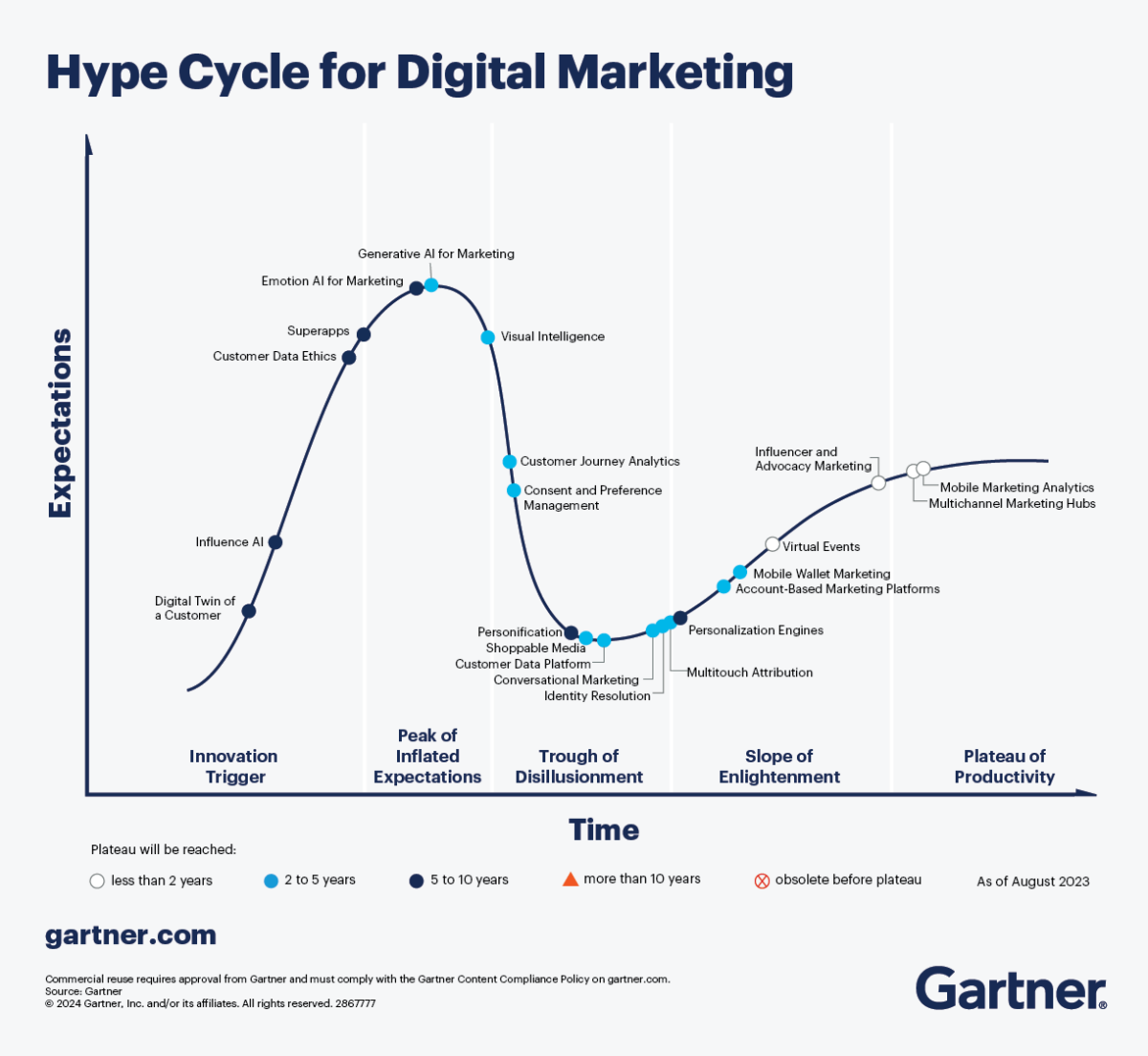In a world where many apps and digital platforms are vying for our attention, super apps have emerged as a potential solution to simplify and streamline our digital experiences. Superapps, which integrate multiple functions such as messaging, payments, shopping, and more into a single platform, have the potential to revolutionise the way we interact with digital services.
Marketing leaders are under increasing pressure to achieve more with limited resources despite their strong interest in understanding their customers comprehensively. At the same time, new technologies like generative AI are reshaping marketing tactics. To keep you informed, we explore three pivotal technological developments highlighted in the latest Gartner Hype Cycle for Digital Marketing.
Gartner’s 2024 Digital Advertising Hype Cycle illuminates marketers’ challenges and opportunities in the ever-evolving digital landscape. From technical complexities to regulatory issues, the report delves into the advancements and innovations shaping the future of marketing, such as marketing analytics, programmatic advertising, and the integration of AI.

One of the key takeaways from the report is the growing emphasis on consent-based targeting, data transparency, and the utilisation of first-party data sourcing in marketing strategies. As marketing technologies continue to advance, the costs associated with these tools are also increasing, particularly with the development of AI-driven solutions that require substantial processing power.
The report identifies several emerging technologies that will significantly impact the marketing landscape. Generative AI for marketing, customer data platforms (CDPs), retail media networks (RMNs), data clean rooms, and programmatic segment-based advertising (PSBA) are among the critical technologies highlighted in the report.
Generative AI for marketing has witnessed significant advancements, potentially enhancing marketing creativity and productivity. However, the rapid adoption of this technology has also raised ethical and societal concerns, leading many marketers to approach it cautiously. Customer data platforms (CDPs) are also gaining momentum, focusing on enhancing data connectivity across marketing suites and addressing privacy and regulatory compliance challenges.
As retail media networks (RMNs) continue to expand, they present opportunities for online sales and increased investment in performance. However, challenges such as fragmentation, pricing issues, and ad spending pressure have led to RMNs’ descent into the “trough of disillusionment.” Data clean rooms and programmatic segment-based advertising (PSBA) are also poised to play pivotal roles in addressing data privacy and targeting challenges in the marketing ecosystem.
The report also addresses the impact of Google’s decision not to deprecate third-party cookies as initially planned. This decision has significant implications for various marketing technologies, including generative AI. It has prompted firms to reassess their forecasts and strategies in light of the evolving digital landscape.
Claudia Ratterman, Gartner Director Analyst, commented: “With just two to five years out from maturity, generative AI is a transformational technology for digital marketing and has profound business impacts, including on content discovery, creation, authenticity and regulations. Its rapid ascent will continue to impact the future of marketing technologies.”
In conclusion, the emergence of super apps and the advancements in marketing technologies outlined in Gartner’s 2024 Digital Advertising Hype Cycle present both opportunities and challenges for marketers. As the industry continues to evolve, it will be crucial for marketers to navigate the complex landscape of emerging technologies and prioritise use cases that align with their business objectives while addressing ethical, regulatory, and societal implications. By staying abreast of these developments, marketers can leverage these technologies to streamline digital experiences and optimise their campaigns in an increasingly interconnected digital ecosystem.



